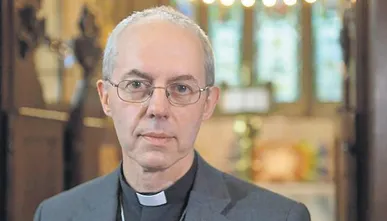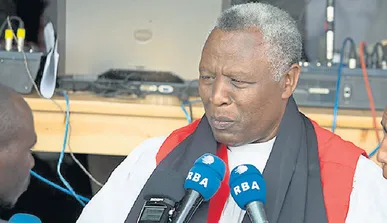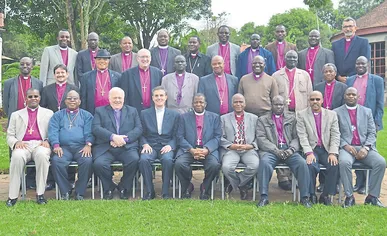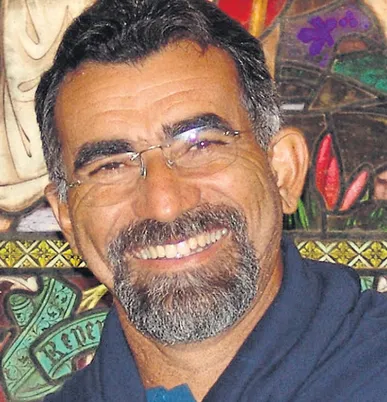
Standing on the authority of God’s Word
Charles Raven
Date posted: 1 Sep 2018
In this column last month, Chris Sugden and Vinay Samuel helpfully answered the question ‘Why GAFCON ?’. This month, as the full significance of the third GAFCON conference held in June becomes clearer, I want to offer a personal reflection on the question of where GAFCON is going.
The short answer is nowhere! The appeal in GAFCON’s Letter to the Churches to the Archbishop of Canterbury to restore godly leadership has been ignored and there can be no doubt now that it is through GAFCON that the faithful Anglican tradition will be continued. The powers-that-be seem determined that the Communion should embrace the optional orthodoxy of ‘good disagreement’.

Global communion with colonial structure
Charles Raven
Date posted: 1 May 2018
In his insightful contribution for this column
last month, Chris Sugden showed that the
lack of accountability and anxiety about
brand protection revealed
in the Oxfam
scandal are also unresolved problems for
the Anglican Communion.
Both have a global reach and both have to
deal with imbalances of power and the need
for inclusive leadership.

Rwanda: recovering the Great Commission
Charles Raven
Date posted: 1 Mar 2018
In January two new Anglican Primates were elected, the Bishop of Maridi, Justin Badi Arama, as Archbishop of South Sudan and the Bishop of Shyira, Dr Laurent Mbanda, as Archbishop of Rwanda.
Both nations have suffered internecine violence, and by far the most notorious example remains the Rwandan genocide of 1994 in which an estimated 1 million people died. Given the long history of insecurity which predated South Sudan’s recent independence, internal strife was predictable, but Rwanda was an established kingdom well before the colonial era, in which different ethnic groups lived peacefully. Moreover, Rwanda was the home of a powerful revival in 1929 which spread spontaneously during the 1930s and became known as the East African Revival.

Bishops rebooted
Charles Raven
Date posted: 1 Jul 2017
Anglicans claim to be part of the Reformed Western catholic tradition and one of the most visible ways that continuity over the centuries is maintained is through episcopacy, which the English evangelical reformers of the 16th century quite deliberately retained in contrast to their continental counterparts.
Was that wise? In the present-day Anglican Provinces of the West, the claim to Reformed catholicity is looking ever more dubious as apostolic substance ebbs away. Moreover, disunity and doctrinal incoherence in the Anglican Communion has been an episcopally led phenomenon.

Mary Sumner’s leaky umbrella
Charles Raven
Date posted: 1 May 2017
The Mothers Union (MU) is one of the great success stories of the Anglican Communion.
Beginning in 1876 with Mary Sumner’s vision for Christian marriage and family life, the movement now numbers some 4 million members worldwide, with the largest concentration being in Africa.

Anglican renewal in Brazil
Charles Raven
Date posted: 1 Mar 2017
Most Christians in the UK probably have
only the haziest idea of what Anglicanism
looks
like
in
South
America.
The
Edinburgh Missionary Conference of 1910
inhibited Protestant and Anglican missionary work in the continent, while the English
language has always been marginal, unlike
most
other
areas
of
the
Anglican
Communion where British influence was
much stronger.
This is a pity, because out of the continuing
crisis
in
the world-wide Anglican
Communion a reinvigorated and missionary
church is emerging in South America, in
spite of official persecution and rejection. In
fact the pattern of North America is being
repeated. Just as a new GAFCON-recognised
Province,
the Anglican Church
in North
America (ACNA), arose out of the aggressive
and assertive revisionism of the American
Episcopal Church (TEC) and the Anglican
Church of Canada, so in South America a
new orthodox Province is coming into being
as the Anglican Episcopal Church of Brazil
(IEAB) and various TEC satellite provinces
in central and northern South America
follow the
lead of their North American
counterparts.

GAFCON: ‘to free our churches’
Charles Raven
Date posted: 1 Jan 2017
GAFCON has confirmed the dates for its third international conference. Between 17-22 June 2018 it will return to Jerusalem, the venue of the first Global Anglican Future Conference in 2008 (from which the movement takes its name).
The GAFCON announcement explains that ‘The city stands as a constant reminder of the birth of the gospel and the movement’s determination to remain true to the teachings of our Lord and his Word’ and so, to appreciate the significance of the 2018 conference, it is worth recalling how it all began.